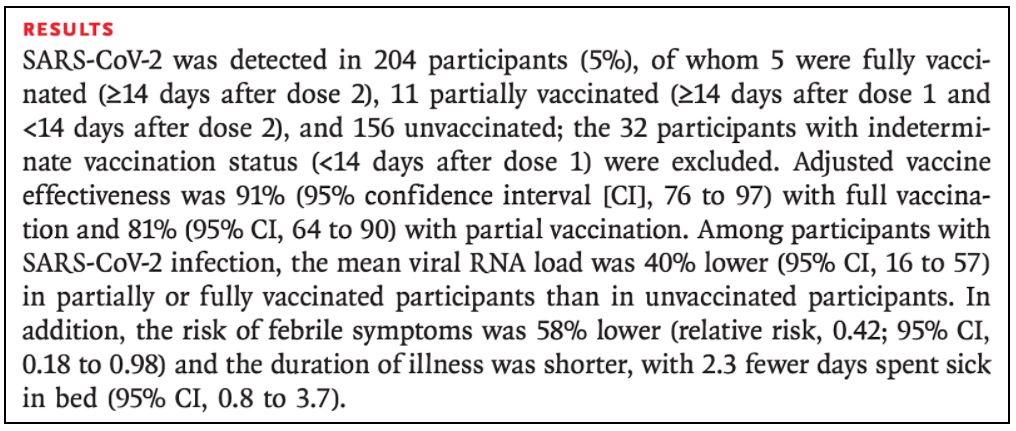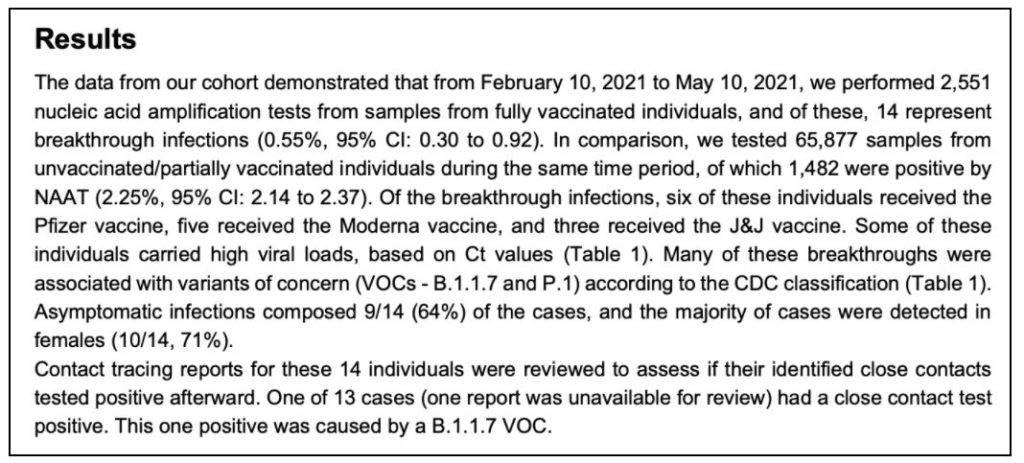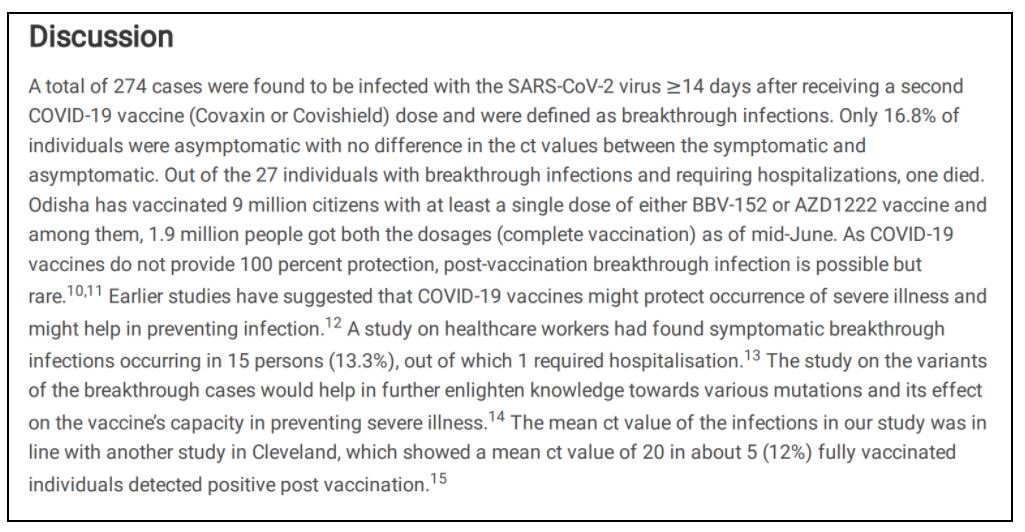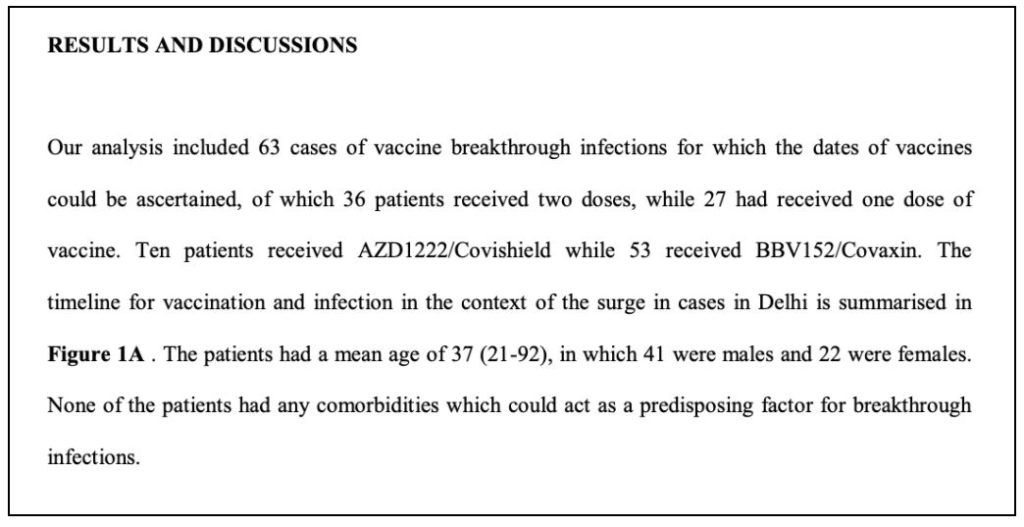Now that around 24% of the world’s population has received at least one dose of the COVID-19 vaccine, various studies are being done to understand the extent of breakthrough infections and the variants causing these infections. Here is a review of some such studies.
There is general agreement world over that vaccination of a large section of the population against the SARS-CoV-2 virus (COVID-19) is critical to curb the spread of infections and prevent the virus from mutating further. Concerted efforts of a few countries ensured that the vaccines were available within a year from the breakout of the pandemic. More than 3.1 billion doses of COVID-19 vaccines have been administered across 197 countries, as of 2 July 2021. In other words, around 24% of the world population has received at least one dose. However, only 1% of the population in low-income countries received the vaccine.
All the vaccines, prior to being administered, are tested in multiple stages of clinical trials for safety and efficacy on the basis of which regulatory bodies give approval or authorization for emergency usage as in the case of COVID-19. Multiple studies showed that the vaccines currently being used around the world reduced the probability of getting infected by the virus significantly. Even if infected, the vaccine helps reduce the severity of the infection and the need for hospitalization. Furthermore, it helps limit the spread of this disease to close contacts including family members, friends, relatives and co-workers.
Breakthrough infections are not unexpected
However, no vaccines are 100% effective at preventing illness in vaccinated people. There will still be a small percentage of fully vaccinated people who may still get infected and an even smaller percentage that may get hospitalized or even die from the COVID-19 infection. Such cases where fully vaccinated persons get infected when exposed to the virus are known as ‘breakthrough cases’. CDC defines breakthrough infections as the detection of SARS-CoV-2 RNA or antigen in a respiratory specimen of a person more than 14 days after receipt of all recommended doses of an approved COVID-19 vaccine. There are multiple factors that are responsible for breakthrough infections. These can be factors pertaining to
- Person– People whose immune systems are compromised by cancer, or some other conditions may be more prone to infection, or due to carelessness of the person by not taking precautions- wearing the mask, or physical distancing, or through exposure to an infected person just before getting fully vaccinated.
- Vaccine– Different vaccines have different efficacies. Improper storage or thawing, error in dosing, manufacturing issues, and delay in getting a second dose may also contribute to breakthrough infections.
- Virus– Vaccines need not be effective against all variants/mutants of the virus. For example, studies suggest that the AstraZeneca vaccine seems to provide reduced protection against the B.1.351 variant first identified in South Africa. Studying which variant is predominantly causing breakthrough infections helps understand the cause and plan the relevant course of action.
One in 10,000 fully vaccinated persons got infected in the US
It is to be understood that a small percentage of breakthrough infections cannot be prevented. To put in perspective, more than 10,000 breakthrough cases were reported between 1 January and 30 April 2021 in the USA. During this period, approximately 101 million persons in the United States had been fully vaccinated. Though the number of cases might seem large, only about one in 10,000 persons who were fully vaccinated got infected. What is important to study in the breakthrough cases are, the severity of the disease, need for hospitalization and mortality. Many studies around the world have begun looking at these breakthrough cases. Here is a review of a few of these studies.
Viral load in persons fully vaccinated with mRNA vaccine was lower than in unvaccinated persons
A cohort study (published in the New England Journal of Medicine on 30 June 2021) involving 3975 health care personnel, first responders, and other essential and frontline workers from 6 US states, was funded by the National Center for Immunization and Respiratory Diseases and the CDC. The study found that 204 participants (5%) got infected with COVID-19. A total of five (5) of them were fully vaccinated, 11 partially vaccinated, and the remaining 156 were unvaccinated. It was observed that participants who were partially or fully vaccinated with the Pfizer and Moderna messenger RNA (mRNA) vaccines had a viral load that was 40% less than that of unvaccinated participants. Furthermore, the risk of having COVID-19 with an accompanying fever was 58% lower for vaccinated participants, who reported two fewer days sick in bed, on average, and an overall length of illness that was six days shorter than that of unvaccinated people.

The infection lasted for two or more weeks among unvaccinated participants while for vaccinated participants, it lasted for only a week. The data for the study was from 14 December 2020 to 10 April 2021. An important finding of the study was that administration of mRNA vaccines reduced the number of viral RNA particles and the duration of viral RNA detection, weakening the infectivity of the coronavirus, implying that mRNA vaccines such as Pfizer and Moderna are highly effective in preventing the infection and may help mitigate the effects of breakthrough infections.
Characterization of variants causing breakthrough infections is important
Another study led by researchers at Indiana University analysed whole-genome sequences to detect breakthrough infections among the students and employees on the Indiana University campus. The findings of the study showed that between 10 February and 10 May 2021, of the 2,551 nucleic acid amplification tests (NAAT) conducted on samples from fully vaccinated individuals, 14 showed breakthrough infections. However, the percentage of positives among the vaccinated group was lower than among the unvaccinated/partially vaccinated group. Many of these breakthroughs were associated with variants of concern B.1.1.7 (alpha) and P.1 (gamma), according to the CDC classification. The results also added that fully vaccinated individuals, including those with asymptomatic infections, are less likely to serve as a source of infection for others. The study concluded that the results reinforced the need to get vaccinated to reduce the spread of COVID-19. Also, characterization of variants and diagnosis of asymptomatic infections is also needed.

National surveillance to identify the breakthrough infection and detect circulating viruses is required in India
In India, a preliminary study conducted during 1 March 2021 and 10 June 2021 recorded the vaccine breakthrough cases of Covaxin and Covishield through passive and voluntary reporting at various healthcare facilities of Odisha. 274 breakthrough infections were recorded of which almost 83.2% of the individuals were found to be symptomatic with 9.9% of those required hospitalization (27 individuals of which one died) and 16.8% were asymptomatic. Though 35 had received Covaxin and 239 received Covishield, there was no significant difference in the cases between the two vaccine recipients. In mid-June, around 9 million citizens in Odisha had received at least a single dose and among them, 1.9 million people received both doses. The study called for the need for national surveillance to identify the breakthrough infection and detect circulating viruses. A larger study to determine whether modified vaccines or doses are required to battle the mutating variants has been recommended.

Delta variant was most prominent in emergency cases reported in AIIMS
Another analysis reported 63 cases of vaccine breakthrough infections in Delhi, of which 36 patients received two doses, while 27 had received one dose of vaccine. 53 patients had received Covaxin and 10 patients had received Covishield. Samples that were subjected to whole-genome sequencing, were collected as part of routine testing from patients who reported at emergency department in AIIMS. The study identified that majority of the breakthrough infections following vaccination with Covishield and Covaxin were caused by the lineage B.1.617.2, popularly known as delta variant, which has been classified as a variant of concern (VoC). 23 samples (12 fully and 11 partially vaccinated) were found to have the delta variant while 4 samples were of B.1.617.1 variant (kappa variant) and 1 sample was of B.1.1.7 variant (alpha variant). Irrespective of vaccine status, the viral load was high in all the patients. No mortality was reported even though most of the cases had presented with high-grade unremitting fever for 5-7 days. The report identified the role of VOCs in breakthrough cases even among vaccinated population.

Further studies on Breakthrough cases are the need of the hour
To summarize the studies, vaccination is important in reducing viral loads and the spread of the pandemic. They also help in reducing the severity of infections. At the same time, these limited studies on breakthrough cases highlight the need for greater study of breakthrough cases including the genomic sequencing of virus samples to identify the variants causing these breakthrough cases. Such studies will go a long way in planning the future course of action against the virus including the need to modify the virus.
Featured Image: COVID-19 breakthrough cases


